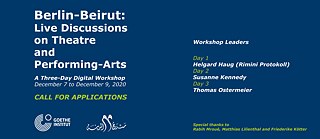Berlin-Beirut: Live Discussions on Theatre and Performing Arts
A Three-Day Digital Workshop
December 7 to December 9, 2020Technical support was provided by Amon Ritz
On the initiative of Nidal Al Achkar, the Al Madina Theatre Beirut, in cooperation with Rabih Mroué, Matthias Lilienthal and the Goethe-Institut Lebanon, initiated a mini-festival for interested theatre students and theatre makers in Beirut. During the three-day program, German theatre-makers reported on their work and presented new approaches in lecture formats, discussions and workshops; in selecting the theatre-makers, care was taken to cover the widest possible range of theatre languages.
Each day a workshop leader presented a work, which was then followed by a lecture on the work and discussions with the participants. The number of active participants in the sessions was limited to 20, however a link for a YouTube live was published on the social media platforms of the Goethe-Institut and the Al Madina Theatre.
Helgard Haug (Rimini Protokoll)
Helgard Haug gave an insight into the collective documentary work of Rimini Protokoll and the play „Chinchilla Arsehole, eyey“, which asks some essential questions: to what degree can theatre tolerate an absence of intent? How much protection can theatre offer? And after the applause is over, it may become clear that this piece isn’t really about Tourette. It is actually about the audience, about theatre and about the fear of losing control.
About Rimini Protokoll
About Chinchilla Arsehole, eyey in the press
Susanne Kennedy
Susanne Kennedy gave an insight into her work by the example of her plays “Drei Schwestern” (Three Sisters) and “Ultraworld”.
Trailer Drei Schwestern
Trailer Ultraworld
About Susanne Kennedy and her work
Thomas Ostermeier
Thomas Ostermeier gave an insight into his work as a director by the example of the production „An Enemy of the People “. In his play “An Enemy of the People” Henrik Ibsen walks a fine line between honesty and fanaticism. The play poses the question: what is the potential for truth and transparency in a commercialized society?
In Ostermeier’s adaptation the crucial scene of Ibsen’s play, showing the public debate about the future of the spa and Stockmann’s accusations, leads to an open discussion inviting the audience to participate. A film team accompanied “An Enemy of the People” during some of its tours, documenting the different reactions in different parts of the world. In his workshop Thomas Ostermeier showed some extracts of this documentary and commented on them, and talked about his notions of a socially relevant theatre, triggering a reconsideration of positions and certainties.
Trailer An Enemy of the People
